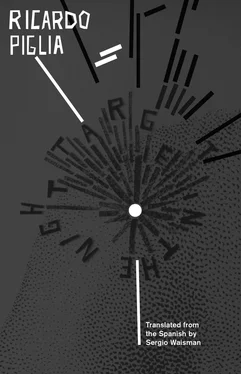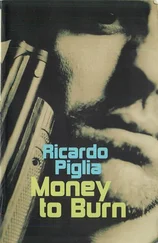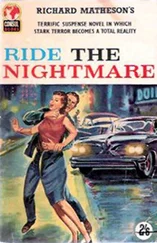Ricardo Piglia - Target in the Night
Здесь есть возможность читать онлайн «Ricardo Piglia - Target in the Night» весь текст электронной книги совершенно бесплатно (целиком полную версию без сокращений). В некоторых случаях можно слушать аудио, скачать через торрент в формате fb2 и присутствует краткое содержание. Год выпуска: 2015, Издательство: Deep Vellum, Жанр: Современная проза, на английском языке. Описание произведения, (предисловие) а так же отзывы посетителей доступны на портале библиотеки ЛибКат.
- Название:Target in the Night
- Автор:
- Издательство:Deep Vellum
- Жанр:
- Год:2015
- ISBN:нет данных
- Рейтинг книги:3 / 5. Голосов: 1
-
Избранное:Добавить в избранное
- Отзывы:
-
Ваша оценка:
- 60
- 1
- 2
- 3
- 4
- 5
Target in the Night: краткое содержание, описание и аннотация
Предлагаем к чтению аннотацию, описание, краткое содержание или предисловие (зависит от того, что написал сам автор книги «Target in the Night»). Если вы не нашли необходимую информацию о книге — напишите в комментариях, мы постараемся отыскать её.
is an intense and tragic family history reminiscent of
, in which the madness of the detective is integral to solving crimes.
, a masterpiece, won every major literary prize in the Spanish language in 2011.
Ricardo Piglia
Target in the Night — читать онлайн бесплатно полную книгу (весь текст) целиком
Ниже представлен текст книги, разбитый по страницам. Система сохранения места последней прочитанной страницы, позволяет с удобством читать онлайн бесплатно книгу «Target in the Night», без необходимости каждый раз заново искать на чём Вы остановились. Поставьте закладку, и сможете в любой момент перейти на страницу, на которой закончили чтение.
Интервал:
Закладка:
By then the two of them had also entered the hall. Bravo greeted people he knew as they walked past the bar and took a seat at a table off to a side, near the windows, facing the gardens outside.
“Everyone is now saying that Tony had brought a bunch of money with him when he arrived. But nobody can explain why he brought it, or what he was waiting for. Americans can bring as much money into the country as they want to, they don’t have to declare anything. The military set up the arrangement during the time of General Onganía,” Bravo told Renzi, as if he were sharing a personal secret. “Liquid capital, foreign investment, it’s considered legal. Who covers the economy at El Mundo ?”
“Ameztoy,” Renzi said. “According to him, Perón is controlled by European companies.”
Bravo looked at him, amazed.
“European?” he remarked. “But that’s antediluvian, from the time of the ñaupa.” Like everyone in the province — as Renzi realized after his conversations and interviews from that day — Bravo used arcane words and out-of-date expressions deliberately to try to seem more genuinely from out in the country. “The freedom to move currency was imposed by the Americans as a condition to bringing in foreign investment. Now it’s used to deal money under the table to make deals on the harvests.”
“And that’s what Durán was doing,” Renzi said. “Moving money.”
“I don’t know, that’s what people say. Don’t go and cite me as a source, Emilio, I’m the town’s social conscience. I say what everyone thinks but no one dares to say.” He paused. “Snobbery is the only way to survive in these places,” he added, and went on to explain why he was accepted in such a rarified atmosphere.
Bravo, at thirty, looked like an old man. It wasn’t that he had aged prematurely, but that old age was part of his life, his face was covered with scars because he’d been in an automobile accident. He was an excellent tennis player as a youth, but his career was interrupted soon after he won a junior tournament at the Law Tennis Club in Viña del Mar, and he never recovered from his unfulfilled expectations. He had so much natural talent for tennis that people called him Stumpy — just like Carlos Gardel was called the Mute — and, like everyone with a natural talent, when he lost his gift — when he was no longer able to use his gift — he became a kind of spontaneous philosopher who looked at the world with the skepticism and clarity of Diogenes in the garbage can. He hadn’t been able to accomplish anything with the gift he was given, except to win the final of that junior tournament in Chile over Alexis Olmedo, the Peruvian tennis player who’d go on to win Wimbledon years later. Bravo was forced to retire from the circuit before even entering it due to a strange lesion on his right hand that kept him from playing. That’s when his decadence and old age began. He returned to his hometown, where his father, a hacienda auctioneer, got him the position at the newspaper as the society page reporter — because he still had an aura about him of having played tennis on the courts at a time when only the upper classes played the white sport.
“No one can imagine,” he said to Renzi, after they had a few drinks and entered the stage of frank confessions, “what it’s like to have a talent for something and not be able to use it. Or at least to think that one has a talent for something and not be able to use it.”
“I know,” Renzi said. “When it comes to that, half of my friends (and I myself) suffer the same illness.”
“I can’t play tennis anymore,” Bravo complained.
“Usually my friends have so much talent that they don’t even need to do anything.”
“I understand,” Bravo said. “Can you imagine how big of snobs they are here, they think of me as one of their own because I trained with Rod Laver.” He paused, waiting for Renzi’s smile. Bravo was rambling a bit, drinking the free whiskey he was served whenever he came to the Club. “Sometimes, when I need money,” he said all of a sudden, “I go and play paleta against country folk who don’t know who I am, and I always win. There’s nothing more different from a tennis court than the walls of a Basque pelota game, but the key is still to see the ball, and my eyesight is just fine. I could play left-handed, with my hands tied, and I’d still win. In Cañuelas I beat Utge,” he said, as if he had defeated Shakespeare in a poetry contest.
Bravo paused again, and went on, as if he felt the need to continue telling Renzi his secrets. He told him that sometimes he thought he could hear the crisp sound of a tennis ball catching the line, but that so much time had passed since his experience on the courts that it would take him a while to identify the sound. A sound that to this day still moved him.
Renzi thought again that Bravo was ranting a bit, but he was used to it. It wasn’t unusual for reporters to digress and ramble when they spoke to keep from saying anything. Personal secrets and false news, that was the genre.
“You can’t imagine the deals the military are making before they leave,” Bravo said. “They’re going to sell everything, even their tanks. Everyone here is sure that Perón is coming back and that the soldiers are going back to their barracks. They’re making as many deals as they can before the tortilla is flipped over. Speaking of which, should we order something to eat? They make a Spanish tortilla here you just can’t find in Buenos Aires.”
Bravo ordered another whiskey. Renzi was hungry, so he took Bravo’s suggestion and ordered a Spanish tortilla and a bottle of wine.
“Which wine would you prefer, sir?” asked a waiter with the face of a bird, looking at Renzi with a strange mixture of distance and disdain.
“Bring me a bottle of Sauvignon Blanc,” Renzi said. “And a bucket of ice.”
“Of course, sir,” the waiter said, with the manners of an idiot who believed he was the son of Count Orlov.
Bravo lit a cigarette, and Renzi saw that his right hand shook. It was a little deformed, with an ugly protuberance at the wrist. Renzi thought that Bravo was using his right hand as if he were forcing himself to do so, as if he were still in physical therapy. Renzi pictured the electrical machines, the metal clips and thin wires attached to the hand to stretch the nerves and the joints.
“Can you imagine being a society page reporter in a town like this? People tell you the news on the telephone before events occur, if you don’t promise them you’ll publish it, they don’t do it. First they make sure it’ll make the news, then the action happens,” Bravo said. “Everything is arranged in here, in the Club. That woman back there, at the round table, that’s one of the Belladona sisters.”
Renzi saw a young redhead, tall and arrogant, leaning distractedly toward the man speaking next to her — one of those men whose heads look too small for their bodies, lending them a sinister appearance, as if their human torso ended at the face of a snake. It was the Prosecutor, Renzi recognized him from television. The young woman was speaking now, resting back in her chair, her left hand between her breasts, as if she were trying to keep warm. She’s not wearing a bra, Renzi thought, the best little tits in the Argentine pampas. He saw her shake her head no, without smiling, and jot something down on a piece of paper. Then she said goodbye with a quick kiss on the cheek and walked toward the staircase leading downstairs, her gate confident and seductive.
“It started a while ago,” Bravo said, and began telling the story. “Cueto got one of the first Harley Davidsons in Argentina, and when he showed up in town with the machine, all Ada Belladona wanted was to get a ride on his motorcycle. He went out with her, gave her a ride around the main square, and immediately they had an accident. Ada broke a leg, Cueto came out unscathed. He always said that the key to driving a motorcycle was knowing how to fall. That was his theory. The first thing an athlete does, he said, is learn how to fall. He asked her before she got on and she told him that she knew how to fall. But when the motorcycle grazed one of the flowerbeds on the edge of the square, the machine dragged the girl’s leg along for nearly fifty meters. She wasn’t left paralyzed by sheer chance, she had a cast from her hip to her toes. The work of an artist, I think they found a sculptor to do it. Aldo Bianchi or one of those, she used to say, showing off her cast, which ended in a kind of plaster sandal with the stylized form of a siren’s tail. And she used it to lean on it like that. It was incredible, she was as crazy as Cueto was, that young woman, she loved to dance, and one summer night, they went to this place in Mar del Plata, Club Gambrinus. Inside, everyone asked her, What happened to you? Are you okay? She just said that her leg had been crushed by a horse and kept getting up to dance. She’d stick her white, bright leg into the ground, with that shape like the tail of a fish, and spin her body around and around the plaster cast. Like Captain Ahab.” 16
Читать дальшеИнтервал:
Закладка:
Похожие книги на «Target in the Night»
Представляем Вашему вниманию похожие книги на «Target in the Night» списком для выбора. Мы отобрали схожую по названию и смыслу литературу в надежде предоставить читателям больше вариантов отыскать новые, интересные, ещё непрочитанные произведения.
Обсуждение, отзывы о книге «Target in the Night» и просто собственные мнения читателей. Оставьте ваши комментарии, напишите, что Вы думаете о произведении, его смысле или главных героях. Укажите что конкретно понравилось, а что нет, и почему Вы так считаете.












